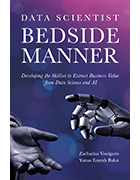Important resources in a data scientist education
There are plenty of resources for data science learning for people entering the field all the way up to managers. Read on for key resources and an excerpt from a new book on data science skills.
With the increased focus on organizations being data-driven, the need for data scientists is growing, and many are joining the field. Data science requires a lot of different skills from mathematics to business presentation to coding skills. It is also an area that requires continuing education.
Especially with the continued lockdown due to COVID-19, many people have opted into online learning in various fields, including data science. And there is no shortage of resources for data scientist education available to people at every level of a data science career, from entry-level to managers.
Zacharias Voulgaris and Yunus Emrah Bulut discuss data scientist education in their new book, Data Scientist Bedside Manner, published by Technics Publications, which is about the holistic skill set necessary for success in data science.
Switching to data science
Voulgaris said one reason for writing the book was to help people transitioning into a data science position. He also said one of the key places to start is reading books about the position.
"Most people who look into data science look into the stuff they can find freely available," Voulgaris said. "This can be a good starting point, but if you want to delve into and learn in-depth, we definitely recommend going for a course -- a serious course -- and also [reading] books [and] having video resources from reliable vendors."
Both Voulgaris and Bulut said data science boot camp programs are strong resources. There are plenty of data science boot camps online. Many offer hands-on experience to participants, and some even offer mentor programs to participants.
Mentors
Mentors are great for data scientist education. Bulut said a good mentor is important to learning data science, as well as many of the soft skills necessary for the job.
"I cannot overstate the value of having a mentor," Voulgaris said.
Finding a good mentor can be difficult. Voulgaris said people who identify as mentors are not always the best choice. People need different things in their relationship with a mentor, and sometimes, it can be difficult to build the rapport someone needs. It's imperative to choose a mentor who will be able to communicate with you and you'll be able to build a relationship with.
Many look to supervisors and others within their working environment for a good mentor. Voulgaris said, in his own experience, this kind of mentorship can be a difficult situation. Sometimes, it can cause controversy if you work in a smaller organization. In his own experience, he had a mentor when working at Microsoft who wasn't on his direct team but was available to lead him in different aspects of data science.
"It's definitely better -- at least for someone new in the field -- to find someone who is like a professional mentor," Voulgaris said.
Professional mentors are typically more committed to mentoring people and can lead to a stronger mentoring relationship. A more professional situation is also good in case the relationship falls through. It is easier to search for the right fit in a structured mentorship program.
"The first thing I would recommend to anyone who is just starting in data science is to find a good mentor," Bulut said.
There are many professional mentoring services -- where money is exchanged -- for data scientists and can be helpful for people jumping into the field. It is also easy to find amateur mentors among work acquaintances and friends in the field.
"The critical thing is to sustain the mentorship [in the] long term," Bulut said. "You cannot learn data science in two weeks or three weeks. It's a long-term process."
Bulut said it's important that both sides have incentives to maintain the relationship. In some instances, it can be monetary, but it can also come from a place of wanting to teach for the mentor. Most people receiving mentorship see the incentive of learning and advancing in their field.
Hands-on experience
One of the best tools in data scientist education is hands-on experience. Especially when it comes to the business side of data science, one of the best ways to learn is by working in the field.
"One way is learning by doing," Bulut said. "Actually, it's probably one of the most effective ways of learning."
But learning by doing is sometimes easier said than done. An issue that many people encounter -- across fields -- is the paradox of needing experience in order to gain experience.
"If you talk about 'real' hands-on experience, that can only be acquired in a real company, by working on a real project," Bulut said.
He said hackathons and boot camps can give mock experience, but they are "limited by nature." The best thing to do, he said, is get involved in mock projects that are "real-like" to encourage more of that experience.
"Sometimes, for beginners in data science, it's next to impossible to find a job right after the boot camp or wherever they've finished learning the craft because of this hands-on learning experience barrier," Voulgaris said.
According to Voulgaris, many data scientists will begin by working in data analytics before going into data science. Data analysts have separate jobs from data scientists, but they do gain experience that can help them transition to data science.
Here is a look at Chapter 11 in Data Scientist Bedside Manner, which covers evaluating different data scientist educational resources that are widely available.







